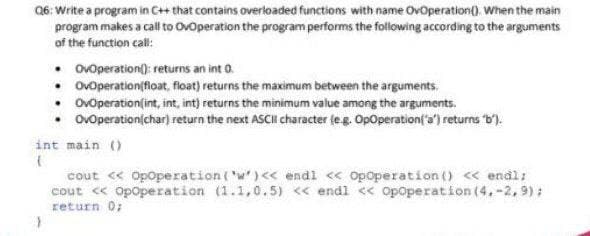Q6: Write a program in C++ that contains overloaded functions with name Ov0peration(). When the main program makes a call to Ovoperation the program performs the following according to the arguments of the function call: • OOperation): returns an int 0. • Ovoperation(float, float) returns the maximum between the arguments. • Ovoperation(int, int, int) returns the minimum value among the arguments. • O0peration(char) return the next ASCII character (eg. OpOperation('a') returns b'). int main () cout « Opoperation ('w')<< endl << Opoperation () < endl: cout < Opoperation (1.1,0.5) << endl << opoperation (4.-2,9): return 0;
Q6: Write a program in C++ that contains overloaded functions with name Ov0peration(). When the main program makes a call to Ovoperation the program performs the following according to the arguments of the function call: • OOperation): returns an int 0. • Ovoperation(float, float) returns the maximum between the arguments. • Ovoperation(int, int, int) returns the minimum value among the arguments. • O0peration(char) return the next ASCII character (eg. OpOperation('a') returns b'). int main () cout « Opoperation ('w')<< endl << Opoperation () < endl: cout < Opoperation (1.1,0.5) << endl << opoperation (4.-2,9): return 0;
Database System Concepts
7th Edition
ISBN:9780078022159
Author:Abraham Silberschatz Professor, Henry F. Korth, S. Sudarshan
Publisher:Abraham Silberschatz Professor, Henry F. Korth, S. Sudarshan
Chapter1: Introduction
Section: Chapter Questions
Problem 1PE
Related questions
Question

Transcribed Image Text:06: Write a program in C+ that contains overloaded functions with name Ovoperation(). When the main
program makes a call to Ovoperation the program performs the following according to the arguments
of the function call:
• ovoperation(): returns an int 0.
• Ovoperation(float, float) returns the maximum between the arguments.
• Ovoperation(int, int, int) returns the minimum value among the arguments.
• OvOperation(char) return the next ASCII character (eg. OpOperation('a) returns b').
int main ()
cout < Opoperation ('w')<< endl << Opoperation () < endl:
cout « Opoperation (1.1,0.5) << endl << opoperation (4.-2,9):
return 0;
Expert Solution
This question has been solved!
Explore an expertly crafted, step-by-step solution for a thorough understanding of key concepts.
Step by step
Solved in 3 steps with 1 images

Knowledge Booster
Learn more about
Need a deep-dive on the concept behind this application? Look no further. Learn more about this topic, computer-science and related others by exploring similar questions and additional content below.Recommended textbooks for you

Database System Concepts
Computer Science
ISBN:
9780078022159
Author:
Abraham Silberschatz Professor, Henry F. Korth, S. Sudarshan
Publisher:
McGraw-Hill Education

Starting Out with Python (4th Edition)
Computer Science
ISBN:
9780134444321
Author:
Tony Gaddis
Publisher:
PEARSON

Digital Fundamentals (11th Edition)
Computer Science
ISBN:
9780132737968
Author:
Thomas L. Floyd
Publisher:
PEARSON

Database System Concepts
Computer Science
ISBN:
9780078022159
Author:
Abraham Silberschatz Professor, Henry F. Korth, S. Sudarshan
Publisher:
McGraw-Hill Education

Starting Out with Python (4th Edition)
Computer Science
ISBN:
9780134444321
Author:
Tony Gaddis
Publisher:
PEARSON

Digital Fundamentals (11th Edition)
Computer Science
ISBN:
9780132737968
Author:
Thomas L. Floyd
Publisher:
PEARSON

C How to Program (8th Edition)
Computer Science
ISBN:
9780133976892
Author:
Paul J. Deitel, Harvey Deitel
Publisher:
PEARSON

Database Systems: Design, Implementation, & Manag…
Computer Science
ISBN:
9781337627900
Author:
Carlos Coronel, Steven Morris
Publisher:
Cengage Learning

Programmable Logic Controllers
Computer Science
ISBN:
9780073373843
Author:
Frank D. Petruzella
Publisher:
McGraw-Hill Education